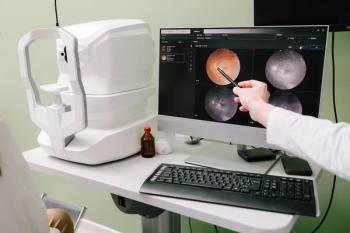
Study shows minocycline has no benefit in slowing, preventing GA expansion in patients with dry AMD
The Phase 2 trial tested whether inhibiting microglia with minocycline might help slow GA expansion and its corresponding vision loss.
A recent study on minocycline showed that the drug has no benefit in preventing or slowing vision loss related to
The study, led by Tiarnan Keenan, MD, PhD, a Stadtman Tenure-Track Investigator at the NEI’s Division of Epidemiology and Clinical Applications, tested whether inhibiting microglia with minocycline might help slow GA expansion and its corresponding vision loss. It was a multi-center, prospective, single-arm, phase II study that enrolled 37 patients at the NIH Clinical Center in Bethesda, Maryland, and at the Bristol Eye Hospital, United Kingdom.1
The trial had a 9-month run-in phase where researchers tracked each participant’s rate of GA expansion. Afterward, participants in the trial took twice-daily, oral, 100mg doses of minocycline for 2 years. After comparing each participant’s rate of GA expansion while taking minocycline to their baseline rate, they found there was no difference in GA expansion rate or vision loss with minocycline. Data showed the mean square root GA enlargement rate was 0.31 mm per year during the 9-month run-in phase and 0.28 mm per year during the 24-month treatment phase.2
Of the 37 patients (mean age of 74.3 [± 7.6 years]) enrolled , 36 initiated the treatment phase. Of those patients, 58% (21 patients) completed at least 33 months of treatment. Fifteen patients discontinued treatment; 8 by request, 6 for adverse events/illness and 1 death not related to treatment.2,3 Of the 129 treatment-emergent adverse events among 32 participants, 49 (38%) were related to minocycline (with no severe or ocular events), including elevated thyrotropin level (15 participants) and skin hyperpigmentation/discoloration (8 participants).
Previous studies have shown that minocycline can help reduce inflammation and microglial activity in the eye, including the retina, and has shown beneficial results for conditions such as diabetic retinopathy.
References:
Inflammation-reducing drug shows no benefit for dry age-related macular degeneration in NIH trial. Press release; March 20, 2024. Accessed March 21, 2024.
https://www.nih.gov/news-events/news-releases/inflammation-reducing-drug-shows-no-benefit-dry-age-related-macular-degeneration-nih-trial Keenan TDL, Bailey C, Abraham M, et al. Phase 2 Trial Evaluating Minocycline for Geographic Atrophy in Age-Related Macular Degeneration: A Nonrandomized Controlled Trial. JAMA Ophthalmol. Published online March 14, 2024. doi:10.1001/jamaophthalmol.2024.0118
Evaluation of Oral Minocycline in the Treatment of Geographic Atrophy Associated With Age-Related Macular Degeneration. ClinicalTrials.gov. Updated February 1, 2024. Accessed March 21, 2024. https://clinicaltrials.gov/study/NCT
Newsletter
Want more insights like this? Subscribe to Optometry Times and get clinical pearls and practice tips delivered straight to your inbox.















































